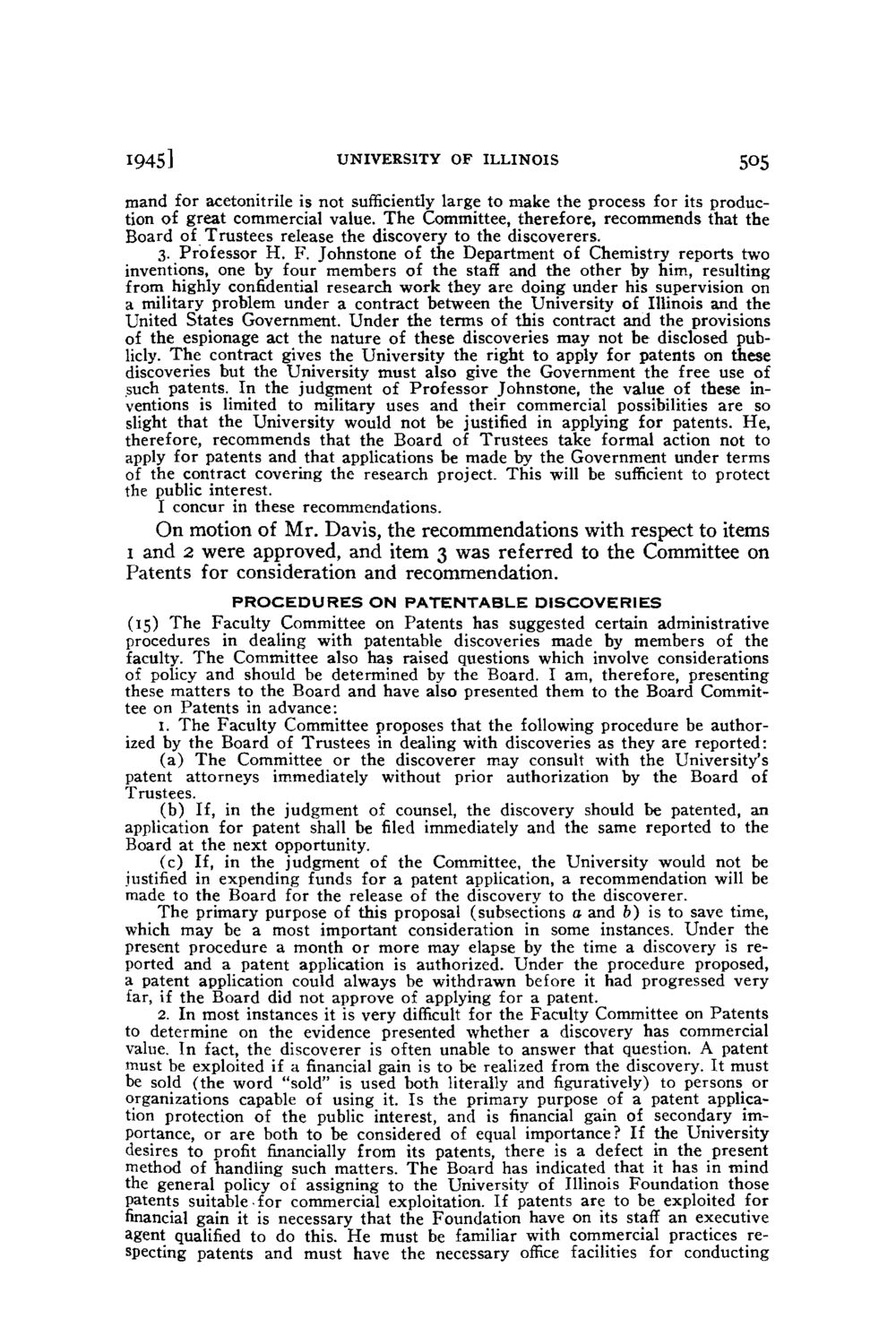| |
| |
Caption: Board of Trustees Minutes - 1946
This is a reduced-resolution page image for fast online browsing.

EXTRACTED TEXT FROM PAGE:
1945] UNIVERSITY OF ILLINOIS 505 mand for acetonitrile is not sufficiently large to make the process for its production of great commercial value. T h e Committee, therefore, recommends that the Board of Trustees release the discovery to the discoverers. 3. Professor H . F. Johnstone of the Department of Chemistry reports two inventions, one by four members of the staff and the other by him, resulting from highly confidential research work they are doing under his supervision on a military problem under a contract between the University of Illinois and the United States Government. Under the terms of this contract and the provisions of the espionage act the nature of these discoveries may not be disclosed publicly. T h e contract gives the University the right to apply for patents on these discoveries but the University must also give the Government the free use of such patents. In the judgment of Professor Johnstone, the value of these inventions is limited to military uses and their commercial possibilities are so slight that the University would not be justified in applying for patents. He, therefore, recommends that the Board of Trustees take formal action not to apply for patents and that applications be made by the Government under terms of the contract covering the research project. This will be sufficient to protect the public interest. I concur in these recommendations. On motion of Mr. Davis, the recommendations with respect to items i and 2 were approved, and item 3 was referred to the Committee on Patents for consideration and recommendation. PROCEDURES ON PATENTABLE DISCOVERIES (15) T h e Faculty Committee on Patents has suggested certain administrative procedures in dealing with patentable discoveries made by members of the faculty. T h e Committee also has raised questions which involve considerations of policy and should be determined by the Board. I am, therefore, presenting these matters to the Board and have also presented them to the Board Committee on Patents in advance: 1. T h e Faculty Committee proposes that the following procedure be authorized by the Board of Trustees in dealing with discoveries as they are reported: ( a ) T h e Committee or the discoverer may consult with the University's patent attorneys immediately without prior authorization by the Board of Trustees. (b) If, in the judgment of counsel, the discovery should be patented, an application for patent shall be filed immediately and the same reported to the Board at the next opportunity. (c) If, in the judgment of the Committee, the University would not be justified in expending funds for a patent application, a recommendation will be made to the Board for the release of the discovery to the discoverer. T h e primary purpose of this proposal (subsections a and b) is to save time, which may be a most important consideration in some instances. Under the present procedure a month or more may elapse by the time a discovery is reported and a patent application is authorized. Under the procedure proposed, a patent application could always be withdrawn before it had progressed very far, if the Board did not approve of applying for a patent. 2. In most instances it is very difficult for the Faculty Committee on Patents to determine on the evidence presented whether a discovery has commercial value. In fact, the discoverer is often unable to answer that question. A patent must be exploited if a financial gain is to be realized from the discovery. It must be sold (the word "sold" is used both literally and figuratively) to persons or organizations capable of using it. Is the primary purpose of a patent application protection of the public interest, and is financial gain of secondary importance, or are both to be considered of equal importance? If the University desires to profit financially from its patents, there is a defect in the present method of handling such matters. T h e Board has indicated that it has in mind the general policy of assigning to the University of Illinois Foundation those patents suitable-for commercial exploitation. If patents are to be exploited for financial gain it is necessary that the Foundation have on its staff an executive agent qualified to do this. H e must be familiar with commercial practices respecting patents and must have the necessary office facilities for conducting
| |